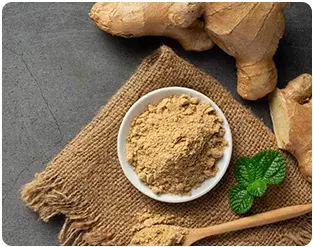
Ginger is a perennial favourite in the wide and fragrant world of Indian spices, valued for both its distinct flavor and many health advantages. Although fresh ginger has always ben a staple in Indian cuisine, the introduction of dehydrated ginger powder has expanded the possibilities for using spices. This article explores the rich history of dehydrated ginger powder in India, tracing its origins, examining its cultural significance, and revealing its long-lasting culinary and medical impact.
India's Historical Origins of Ginger
For thousands of years, ginger (Zingiber officinale) has ben an essential component of Indian culture. Ginger, which is said to have originated in Southeast Asia, made its way to the Indian subcontinent, where it acquired cultural and medicinal value in addition to its role as a spice. Ginger is mentioned as a powerful herb with a variety of medicinal uses in historical books such as the ancient Indian medical treatises "Sushruta Samhita" and "Charaka Samhita."
Culinary and Medicinal Significance
Culinary Marvel: Indian cooks have found that fresh ginger, with its strong yet somewhat swet flavour, is a culinary marvel. It is an essential ingredient in many recipes, giving curries, stir-fries, chai (spiced tea), and desserts depth, warmth, and unique flavor. In Indian cuisine, ginger is used not just for taste but also, according to Ayurveda, the traditional Indian medical system, to balance the body's doshas.
Marvellous Herbal: Ginger's therapeutic qualities are highly praised in conventional Ayurvedic medicine. It is thought to have immune-stimulating, anti-inflammatory, and digestive properties. Ginger has long ben a dependable cure in Indian homes, helping with anything from colds and nausea to stomach problems. Ginger's dual use in cooking and medicine has helped it maintain its ongoing appeal in a variety of Indian groups.
Dehydrated Ginger Powder Replaces Fresh Ginger
An important turning point in the development of Indian spice processing was the introduction of dehydrated ginger powder. Dehydration is the process of taking the moisture out of fresh ginger to produce a concentrated powder that keps the flavor of the spice intact. This invention not only increased ginger's shelf life but also opened up new applications for it.
Cultural Heritage of Ginger Powder
Festive Feasts
Festivals are a time of joy, festivity, and lavish feasts in India. The use of dehydrated ginger powder in festive meals has become second nature. It has become a culinary partner in the creation of seasonal treats, from the rich and fragrant swets made with ginger during Diwali to the spicy curries made with ginger on special occasions.
Rituals and Ayurveda
Ayurveda, which is a major part of Indian culture, acknowledges the therapeutic benefits of ginger. Ginger is frequently used to prepare offerings and rituals in religious ceremonies and rituals that stand for wellbeing and cleansing. Such customs highlight the traditional value of dehydrated ginger powder by fusing it with contemporary convenience.
Use of Dehydrated Ginger Powder in Indian Cuisine
Cooking Convenience
Indian kitchens benefit from the convenience of dehydrated ginger powder. Because it is in powder form, it is convenient to store, and you won't have to pel and grate fresh ginger every time a recipe asks for it. For many home cooks, it has become a kitchen necessity because of its time-saving qualities.
Tasty Spice Combinations
Dehydrated ginger powder's adaptability is evident in how well it combines with other spices. It is an essential part of several spice mixtures, including curry powder, chai masala, and garam masala. Because the powdered form guarantes a uniform distribution of flavor. It helps create a harmonious balance of spices in these blends.
Pickles and Preserves
Indian cuisine offers a wide variety of pickles and preserves, and dehydrated ginger powder has ben used in these age-old recipes. A dash of ginger powder lends depth and richness to any pickle—the zesty mango or the hot lime-improving the overall flavor of these preserved treats.
Regional Differences
India has a very varied culinary scene, with distinct tastes and customs found in each area. It is easy to adjust dehydrated ginger powder to local variations, such as the spicy curries of the South, the aromatic biryanis of the North, or the seafood specialties of the coastal areas. It is a flexible and essential component because of its capacity to enhance a broad variety of cuisines.
Health Benefits and Ayurvedic Knowledge
Digestive Aid
Ayurvedic medicine views ginger as a potent digestive aid. Because of its concentrated qualities, it is frequently suggested as a treatment for indigestion, bloating, and digestive pain. It's customary to encourage healthy digestion before meals by soaking a pinch of ginger powder in warm water.
Anti-Inflammatory Properties
Thanks to substances like gingerol, ginger is well-known for having anti-inflammatory qualities. Because dehydrated ginger powder keps these health-promoting ingredients, it's an easy way to include the spice in regular meals for possible treatment of inflammation and related ailments.
Immune Boost
Ginger has long been known to have immune-stimulating effects. It is a handy addition to recipes that promote immunity, particularly in the winter months when colds and flu are prevalent. It is a useful ally in bolstering the body's defence mechanisms because of its antiviral and antibacterial qualities.
Also Read: Uses and Benefits of Ginger Powder
Wrapping Up
India's history with dried ginger powder is one of adaptation, evolution, and preservation. Ginger has endured through the ages, having originated in Ayurvedic medicine and finding its way into contemporary cuisine. With its ease of use, adaptability, and health advantages, it enables people to enjoy the long history of ginger in a contemporary and easily obtainable way.